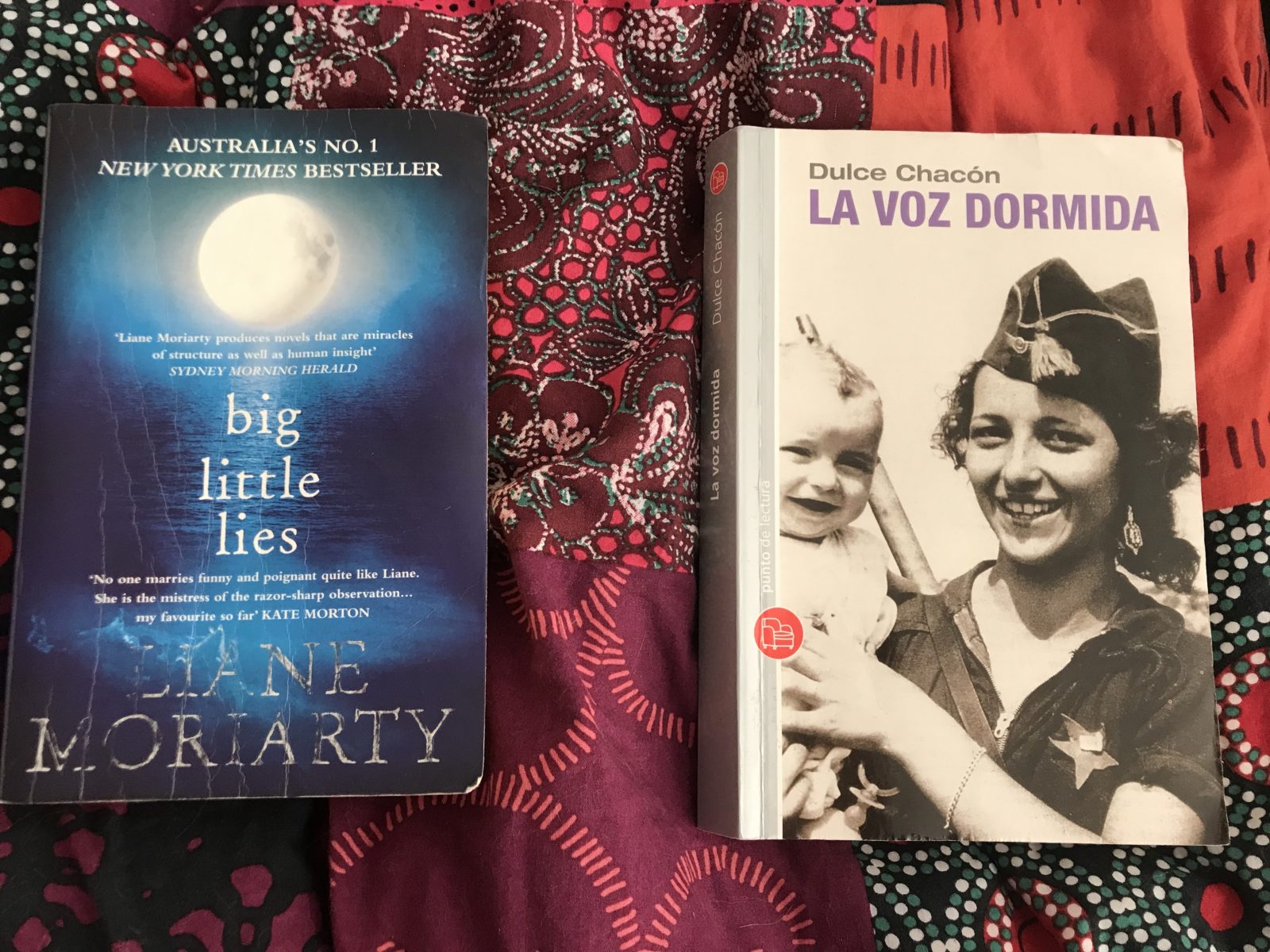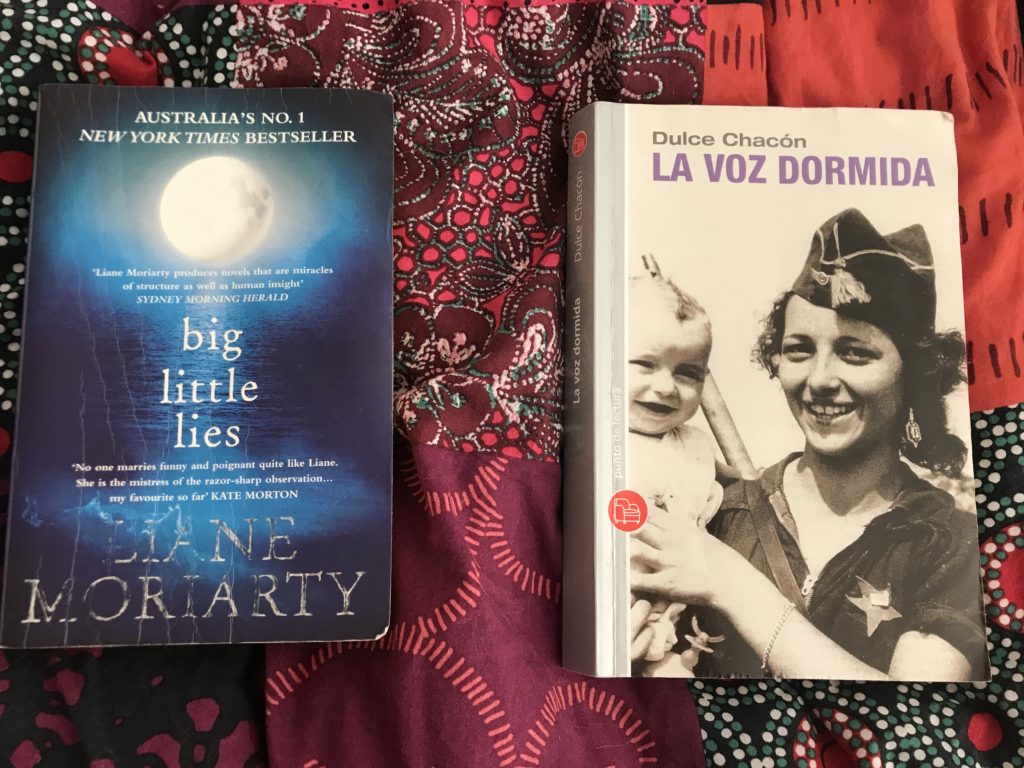“Big Little Lies,” Lianne Moriarty
I swear, every good series or movie that I have watched in the last ten years has been based off of a book. (The moral here is, read more!!) I saw the first season of Big Little Lies, with Reese Witherspoon, Nicole Kidman, Zoë Kravitz, and Shailene Woodley, about three months ago, and then serendipitously stumbled across the book in a second-hand bookshop in Lithuania. What are the odds? I immediately devoured the book, which is (as is almost always the case) better than the series, but not by much. I tend to prefer the book because books can, and do, include a much more detailed version of events and storylines, but the visual representation of the power of female friendship and mutual admiration in the series series is formidable, and frankly, wonderful to see on screen. So my recommendation is to read the book and watch the series—both are absolutely worth the effort.
“La Voz Dormida,” Dulce Chacón
“La Voz Dormida,” or “The Sleeping Voice,” by Dulce Chacón, follows a group of women living in Ventas Prison outside of Madrid just after the end of the Spanish Civil War. The novel takes the time to tell each woman’s diverse story. Some, like Hortensia, are condemned to death; some, like Josefina, for the rest of their lives; some, like Sole and Elvira, make their escape; and some, like Tomasa, finish their sentences, receive a pardon, and are able to return home. All of their stories, however, have pain, torture, and suffering in common. That’s not the only theme they have in common, though: the narrator also shows their supreme strength and willpower, and the love that forms through the bonds they make in prison.
Through the use of short, definitive phrases and commanding narration, Chacón demonstrates that even a group of women in prison, quite possibly the most silenced people to exist, still have a powerful voice if they can find the strength to use it. The flip side of her narrative style is that it often lends itself to being dramatic, something she surely felt was important given the subject matter, but which can actually have the opposite effect after 300 pages.
Today more than ever it essential to remember that has been suffered throughout history in order to avoid repeating it. Novels like Chacón’s highlight the lack of women’s voice in war narrative, and emphasize the vital role that women played in the Spanish Civil War, something that is easily forgotten, but fundamentally important. Chacón’s focus on women and resistance can be seen not only throughout her writing, but also in her personal life. During her life, she was an active member of numerous women’s associations that fought against gender violence and war.
See below a similar review I had to write in Spanish for this novel. Enjoy!
~~~
“La Voz Dormida”, por Dulce Chacón, se centra en un grupo de mujeres que viven en la cárcel de Ventas en los alrededores de Madrid, después del fin de la Guerra Civil Española. La novela relata las diversas historias de cada mujer. Algunas, como Hortensia, condenadas a muerte; otras, como Josefina, condenada de por vida; o las como Sole y Elvira, que escapan; y otras, como Tomasa, que cumplen sus años y reciben un indulto para poder volver a casa. Sin embargo, todas sus historias tienen en común el dolor y la tortura que sufrieron. Pero no es el único tema que tienen en común: también se ve su gran fuerza, su intensa voluntad, y el poder del amor de las relaciones formadas dentro de la cárcel.
Gracias al uso de frases cortas y contundentes, así como una narración muy poderosa, Chacón demuestra en esta novela que hasta las mujeres de la cárcel, el grupo más silenciado que podía existir, podrían tener una voz extremadamente poderosa, si pudieran encontrar la fuerza de usarla. El otro efecto que tiene este estilo narrativo es que muchas veces es muy dramático, algo que definitivamente es importante dado el tema, pero que puede llegar a tener el efecto contrario después de 300 páginas.
Hoy más que nunca es esencial recordar lo que sufrieron nuestros antepasados para no repetir la historia. Novelas como las de Chacón destacan la falta de la voz de la mujer en el género de la literatura de guerra, y enfatizan el rol fundamental que tuvieron las mujeres durante la Guerra Civil Española; algo que se olvida con facilidad, pero al mismo tiempo es sumamente importante. El tema de la defensa de las mujeres se ve no sólo en la literatura de Chacón, sino también en su vida personal: ya que pertenecía a varias asociaciones de mujeres, lo que demuestra su alto compromiso social.

